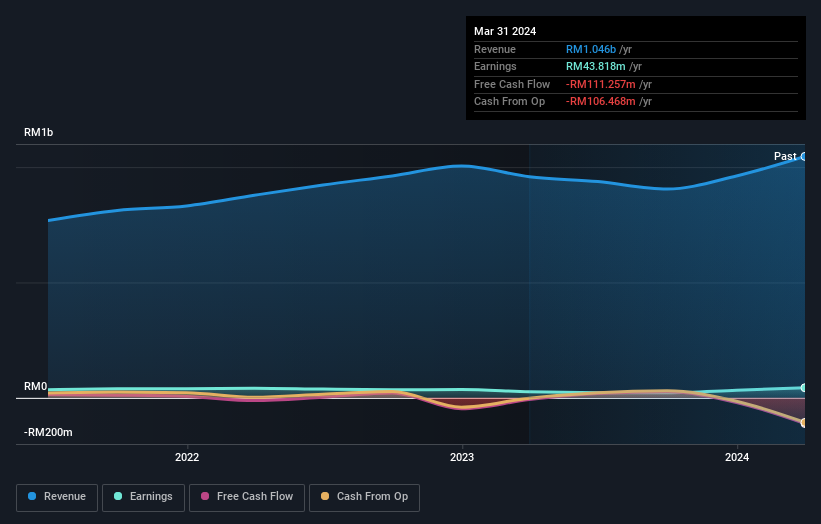Seng Fong Holdings Berhad's (KLSE:SENFONG) market cap up RM83m last week, benefiting both private companies who own 59% as well as insiders
Key Insights
Significant control over Seng Fong Holdings Berhad by private companies implies that the general public has more power to influence management and governance-related decisions
59% of the company is held by a single shareholder (Sumber Panji Sdn Bhd)
To get a sense of who is truly in control of Seng Fong Holdings Berhad (KLSE:SENFONG), it is important to understand the ownership structure of the business. With 59% stake, private companies possess the maximum shares in the company. Put another way, the group faces the maximum upside potential (or downside risk).
While private companies were the group that reaped the most benefits after last week’s 13% price gain, insiders also received a 22% cut.
Let's delve deeper into each type of owner of Seng Fong Holdings Berhad, beginning with the chart below.
See our latest analysis for Seng Fong Holdings Berhad
What Does The Institutional Ownership Tell Us About Seng Fong Holdings Berhad?
Institutions typically measure themselves against a benchmark when reporting to their own investors, so they often become more enthusiastic about a stock once it's included in a major index. We would expect most companies to have some institutions on the register, especially if they are growing.
Seng Fong Holdings Berhad already has institutions on the share registry. Indeed, they own a respectable stake in the company. This suggests some credibility amongst professional investors. But we can't rely on that fact alone since institutions make bad investments sometimes, just like everyone does. If multiple institutions change their view on a stock at the same time, you could see the share price drop fast. It's therefore worth looking at Seng Fong Holdings Berhad's earnings history below. Of course, the future is what really matters.
We note that hedge funds don't have a meaningful investment in Seng Fong Holdings Berhad. Our data shows that Sumber Panji Sdn Bhd is the largest shareholder with 59% of shares outstanding. This implies that they have majority interest control of the future of the company. With 7.5% and 3.0% of the shares outstanding respectively, Tak E and AMMB Holdings Bhd, Asset Management Arm are the second and third largest shareholders. Tak E, who is the second-largest shareholder, also happens to hold the title of Senior Key Executive.
While it makes sense to study institutional ownership data for a company, it also makes sense to study analyst sentiments to know which way the wind is blowing. As far as we can tell there isn't analyst coverage of the company, so it is probably flying under the radar.
Insider Ownership Of Seng Fong Holdings Berhad
While the precise definition of an insider can be subjective, almost everyone considers board members to be insiders. The company management answer to the board and the latter should represent the interests of shareholders. Notably, sometimes top-level managers are on the board themselves.
Most consider insider ownership a positive because it can indicate the board is well aligned with other shareholders. However, on some occasions too much power is concentrated within this group.
Our most recent data indicates that insiders own a reasonable proportion of Seng Fong Holdings Berhad. Insiders own RM154m worth of shares in the RM700m company. It is great to see insiders so invested in the business. It might be worth checking if those insiders have been buying recently.
General Public Ownership
The general public-- including retail investors -- own 12% stake in the company, and hence can't easily be ignored. While this size of ownership may not be enough to sway a policy decision in their favour, they can still make a collective impact on company policies.
Private Company Ownership
It seems that Private Companies own 59%, of the Seng Fong Holdings Berhad stock. It's hard to draw any conclusions from this fact alone, so its worth looking into who owns those private companies. Sometimes insiders or other related parties have an interest in shares in a public company through a separate private company.
Next Steps:
While it is well worth considering the different groups that own a company, there are other factors that are even more important. Case in point: We've spotted 3 warning signs for Seng Fong Holdings Berhad you should be aware of, and 2 of them are concerning.
Of course, you might find a fantastic investment by looking elsewhere. So take a peek at this free list of interesting companies.
NB: Figures in this article are calculated using data from the last twelve months, which refer to the 12-month period ending on the last date of the month the financial statement is dated. This may not be consistent with full year annual report figures.
Have feedback on this article? Concerned about the content? Get in touch with us directly. Alternatively, email editorial-team (at) simplywallst.com.
This article by Simply Wall St is general in nature. We provide commentary based on historical data and analyst forecasts only using an unbiased methodology and our articles are not intended to be financial advice. It does not constitute a recommendation to buy or sell any stock, and does not take account of your objectives, or your financial situation. We aim to bring you long-term focused analysis driven by fundamental data. Note that our analysis may not factor in the latest price-sensitive company announcements or qualitative material. Simply Wall St has no position in any stocks mentioned.
Have feedback on this article? Concerned about the content? Get in touch with us directly. Alternatively, email editorial-team@simplywallst.com

 Yahoo Finance
Yahoo Finance 

